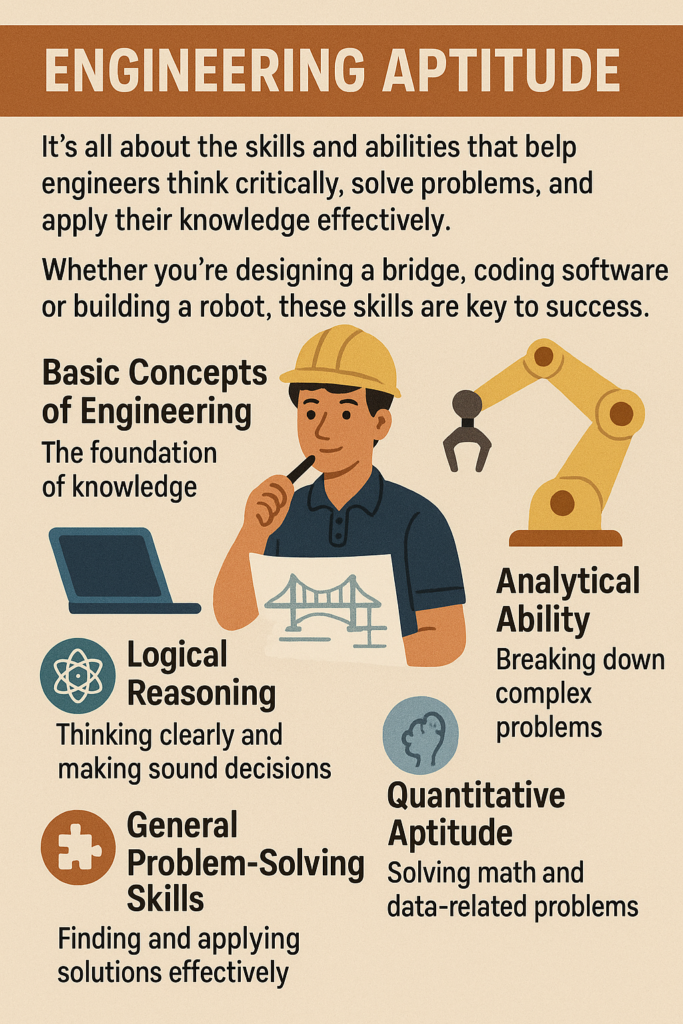Engineering Aptitude in simple terms. It’s all about the skills and abilities that help engineers think critically, solve problems, and apply their knowledge effectively. Whether you’re designing a bridge, coding software, or building a robot, these skills are key to success.

1. Basic Concepts of Engineering (The Foundation)
What is it?
These are the core ideas that every engineer needs to understand, no matter the field—mechanical, electrical, civil, or software. It includes basic principles like:
- Mathematics: For calculations, measurements, and problem-solving.
- Physics: Understanding forces, motion, and energy.
- Chemistry: Knowing materials and how they react.
- Technology: Applying tools and machines to solve real-world problems.
Why it’s Important:
These concepts help engineers design, build, and improve systems, products, or structures.
2. Logical Reasoning (Thinking Clearly and Systematically)
What is it?
Logical reasoning is the ability to think in a structured, step-by-step way to reach conclusions based on facts. It’s like solving a puzzle—finding the missing piece that makes everything fit.
Types of Logical Reasoning:
- Deductive Reasoning: Starting with a general idea and applying it to specific cases.
- Example: All engineers use math. John is an engineer. → John uses math.
- Inductive Reasoning: Observing specific facts and making a general rule.
- Example: The sun rises in the east every day. → The sun always rises in the east.
Why it’s Important:
It helps engineers make decisions, troubleshoot issues, and come up with efficient solutions.
3. Analytical Ability (Breaking Down Complex Problems)
What is it?
Analytical ability is the skill to break down a complex problem into smaller, manageable parts and understand how they work together.
Key Skills:
- Pattern Recognition: Identifying trends or regularities.
- Data Interpretation: Understanding graphs, charts, and numbers.
- Critical Thinking: Evaluating facts to make informed decisions.
Example:
If a machine isn’t working, analytical ability helps you figure out if it’s an electrical issue, a mechanical fault, or a software glitch.
4. Quantitative Aptitude (Working with Numbers and Math)
What is it?
Quantitative aptitude is all about understanding and solving math-related problems. This includes calculations, percentages, ratios, algebra, geometry, and data interpretation.
Why it’s Important:
Engineers use math to design structures, analyze data, and optimize performance.
Common Topics:
- Arithmetic: Basic operations (addition, subtraction, multiplication, division).
- Algebra: Solving equations and understanding variables.
- Geometry: Working with shapes, areas, and volumes.
- Statistics: Analyzing data sets and understanding trends.
Example:
Calculating the amount of concrete needed for a bridge or determining the speed of a car based on distance and time.
5. General Problem-Solving Skills (Finding Solutions to Challenges)
What is it?
General problem-solving skills involve identifying issues, analyzing possible solutions, and choosing the best course of action.
Steps to Solve Problems:
- Identify the Problem: What’s wrong?
- Gather Information: What data do you have?
- Analyze Options: What solutions are possible?
- Make a Decision: Choose the best solution.
- Implement and Review: Put the solution into action and see if it works.
Why it’s Important:
Engineers face unexpected challenges all the time. Strong problem-solving skills help them adapt and find effective solutions quickly.
How These Skills Work Together:
Imagine you’re designing a new smartphone:
- Basic Concepts: Understanding circuits, battery technology, and software.
- Logical Reasoning: Figuring out how to optimize battery life logically.
- Analytical Ability: Breaking down customer feedback to improve features.
- Quantitative Aptitude: Calculating costs, battery efficiency, and screen resolution.
- Problem-Solving: Fixing design flaws or software bugs based on user testing.
Summary:
- Basic Concepts of Engineering: The foundation of knowledge.
- Logical Reasoning: Thinking clearly and making sound decisions.
- Analytical Ability: Breaking down complex problems.
- Quantitative Aptitude: Solving math and data-related problems.
- General Problem-Solving Skills: Finding and applying solutions effectively.
Tags: algebra, analytical ability, analyze options, arithmetic, basic engineering concepts, calculations, chemistry, critical thinking, data interpretation, Decision Making, deductive reasoning, design, Engineering Aptitude, engineering skills, general problem-solving skills, geometry, identify problems, implement solutions, inductive reasoning, logical reasoning, machines, make decisions, Mathematics, pattern recognition, physics, problem-solving, quantitative aptitude, real-world problems., Software, statistics, systems thinking, technical knowledge, technology, troubleshooting


